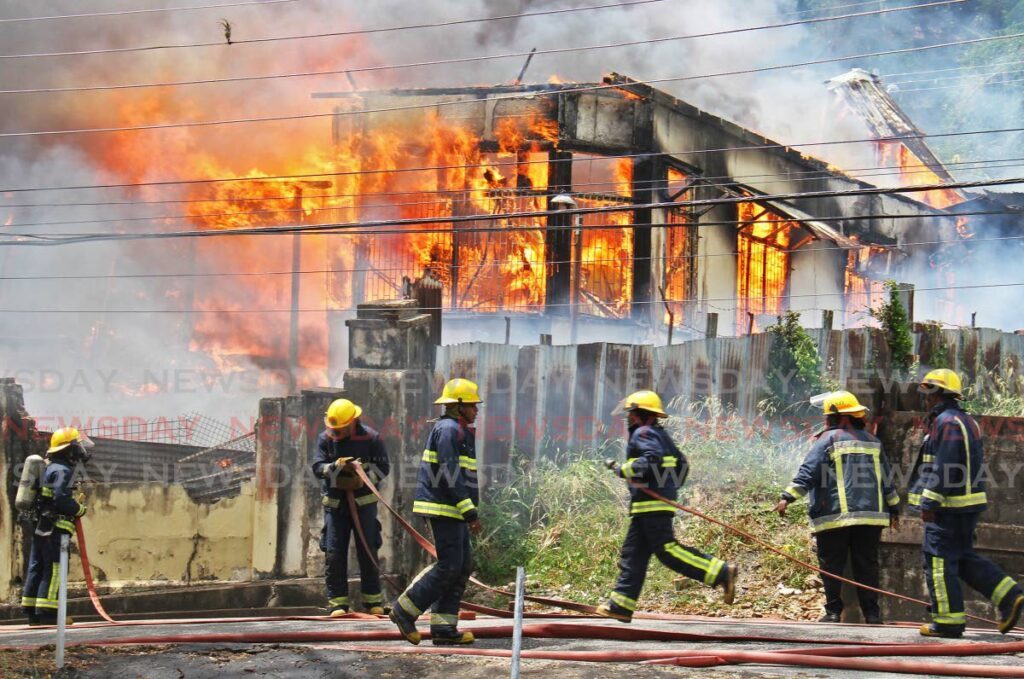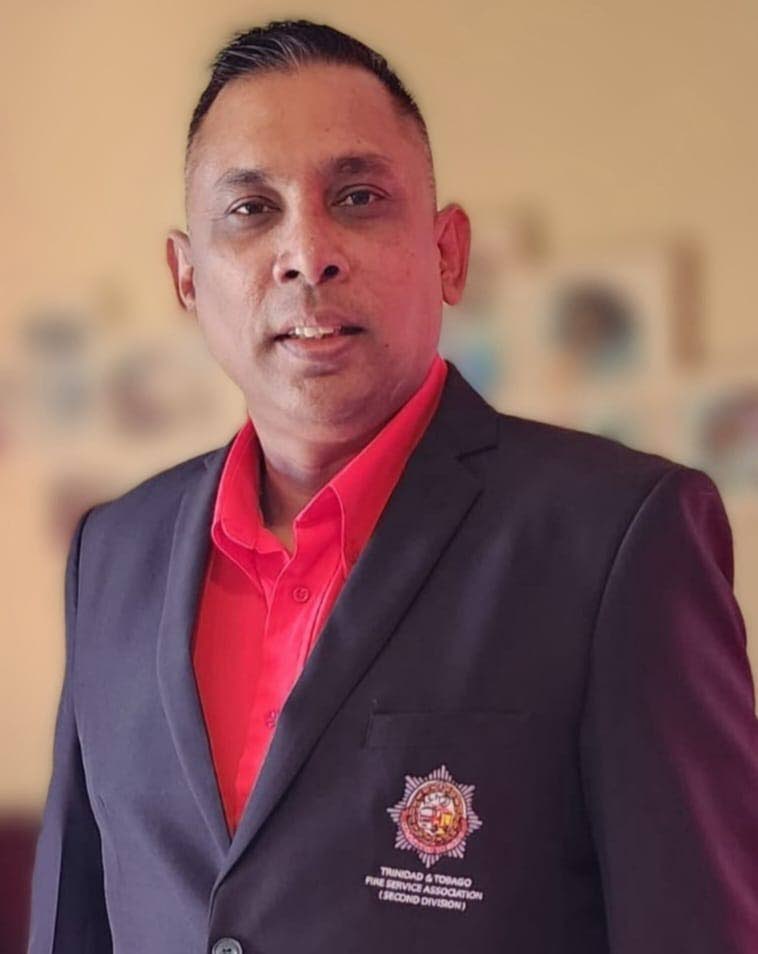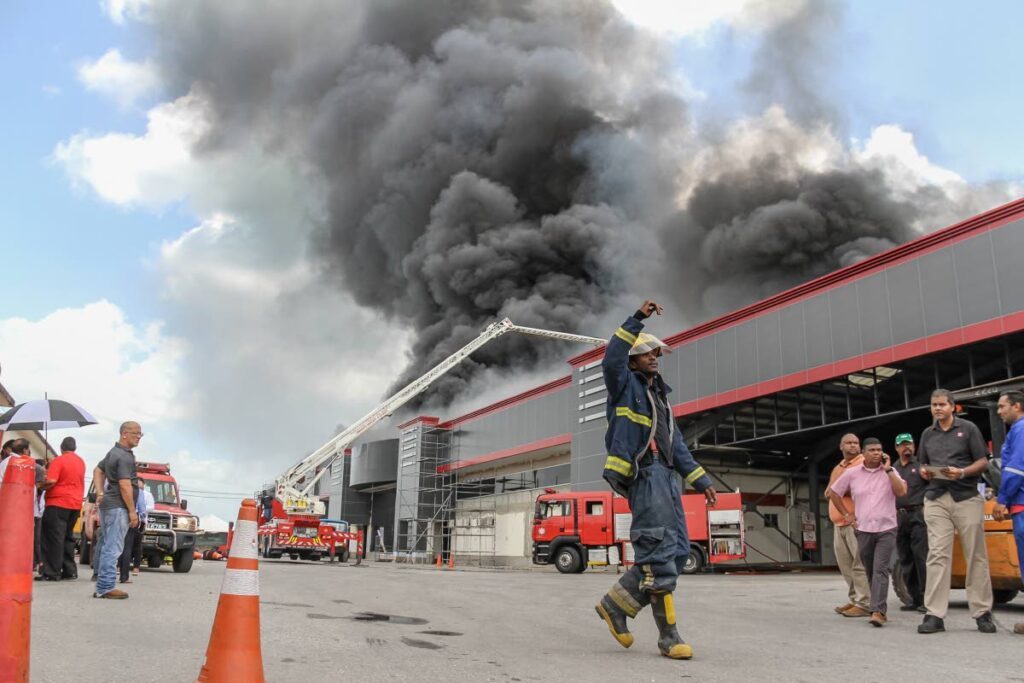Firefighters battle with trauma on job as lives, property lost

Three firefighters have died by suicide this year.
And while all their problems were not known, questions can be raised as to whether their work environment contributed to their actions.
Sunday Newsday recently spoke to several firefighters who described their feelings of having to work without the equipment and resources that would allow them to save lives and livelihoods as heart-sick, demoralised, neglected, caught between a rock and a hard place, angry, and ashamed.
Deputy treasurer of the Fire Service Association of TT acting fire sub officer Dennene Mohammed said, he could tell many stories of officers using their own vehicles to respond to emergencies, fire officers having to use garden hoses to help control fires, or officers heading to the scene of an emergency to try to help in whatever way they could, even though they did not have the equipment to do what was expected of them, until appliances from other jurisdictions arrived.
“Fire officers do not take responsibility of responding to the public’s cries to emergencies lightly. Generally, they want to do their jobs to the best of their ability. They are committed.
“They will go way beyond and use whatever is available to deal with an emergency. An emergency is not going to wait until everything is in place, then to act. Somebody’s life is at risk. Somebody’s property is going up in smoke. So we have to use whatever we have available at the time to do that.”
He said it was not just the lack of tenders but there were challenges getting tyres and repairs for them and other vehicles. He said many of their vehicles were not roadworthy, so when responding to emergencies they had to decide between putting their lives, their crews and members of the public at risk, and responding to someone in peril.
Mohammed has been in the service for 20 years and there have always been resources the fire stations needed but did not get. He said there are 11 fire stations in the northern division and six have no tenders. Two stations in other divisions also have no tenders. At any time, there were hundreds of officers on duty, but there are about ten sets of breathing apparatus in the whole fire service and they have to be shared between officers. He said that was why, during the pandemic, whole shifts had to be quarantined as the disease was spread through the shared apparatus. Some officers eventually purchased masks from their own pockets.

But knowing people are in distress, the officers often take the chance to help them. He said it is even more difficult for them to handle when lives are lost, especially society’s most vulnerable – the elderly, women and children.
He recalled there were officers who broke down in tears or were generally affected when a pregnant woman and several children died in a fire in Couva some years ago, and when three children were trapped in their burning Maraval home in 2021. He also mentioned the deaths of Kemba Morris, 42, and her daughter Zaya, eight, of Siparia, and 98-year-old Malcolm Diaz of Santa Cruz who died in fires this year.
He said after incidences such as those, it was impossible to return to work the next day as if everything was fine.
“Somewhere in the deep recesses in our minds, losing a life due to fire means we have failed. Even though we did not have the resources, the equipment, and so many other things did not aid us to save that life. They were depending on us at that point in time to save them and we didn’t, so it feels like we failed.
“It affects officers really deeply. Eventually we have to tell ourselves we did our best and accept it but it affects us, it affects our morale. To go to work after and be normal is impossible.”
Officers face post-traumatic stress disorder
Mohammed said some fire officers get post-traumatic stress disorder after seeing people maimed, dismembered, burnt or dead on a regular basis. Personally, he said, it has affected his appetite, how he interacts with his family, his moods and more.
“Do you know what kind of individual that creates? Across the services that support system is lacking because we don’t put emphasis on mental health in this country. And that is having an impact on individuals’ behaviour and approaches to how we deal with problems in society.”
He said their main support is a religious group within the service whose members tried to counsel the officers. But clinical assistance is needed. There is also a stress clinic under the Health Ministry that provides psychiatric help, but he said the officers have to be aware there is a problem and be willing to go.
“It (the stress clinic) works, and I know because I attend it, so I encourage other officers to do that. But an individual has to recognise within themselves that they need it. But immediately following an incident there is literally nothing available to help officers cope.”
He believes mental health evaluations should be part of the service’s procedure. He said it is a challenge balancing the neglect with being committed and effective.
“The lack of prioritising of the Fire Service, the constant ignoring of our cries, for years, we are now seeing the consequence of that being paid in lives. The mismanagement and the nonchalant approach by government, by Cabinet, by the administration, by the ministry to give us the tools we require to keep the public safe...that is a sad day in any society.”

He would like to see the bare minimum at each fire station – a tender, tanker, a utility vehicle and an ambulance.
Mohammed said the two new custom-built fire tenders which recently arrived in the country are necessary but are not first responding vehicles that could go on the road and assist with emergencies. He said the one that was on display at the Independence Day parade is for the airport and the other is backup support to lift large volumes of water from bodies of water. He said the older tenders at the airport are run-down and dilapidated and the airport needs a medium level of coverage to maintain its category, hence the new tender.
“If we don’t augment that, the category of the airport would have to be downgraded and certain planes and flights would not be able to come here.”
Leaking steering fluid in Piarco fleet
Fire fighter Kwesi Lewis, assistant secretary in the Association, who is stationed at Piarco agrees with Mohammed. He said there are two new tenders at Piarco Fire Station for over three months and are yet to be commissioned. They have not been inspected, approved or registered by the Licensing Division so they can not be used.
“Anybody landing in the airport will see five trucks lined up in front but it’s only three that’s operational, and all three are leaking hydraulic fluid from the steering really bad.”
He said even though he and his fellow officers mainly serve the airport, the issue of defective vehicles is still a concern as sometimes, with permission from the tower, they respond to road emergencies in the area.
He said the officers are ready and willing to respond to emergencies as the person in trouble could be someone they know. But having defective vehicles means the response will not be as quick, either because they have to top up fluid before they leave the station, or they have to drive slower because of the defect.

He said the way the service treats its officers is disheartening. And many officers feel angry and ashamed when they watch comments about fire officers on social media even though the situation is not their fault.
Low morale among officers
A fire officer in the northern division told Sunday Newsday he has been in the service for 20 years and morale is at an all time low.
He said some officers do not want to go to work, or would show up for their shift to see if there is a fire tender available and, if there is not, they would return home. He said it is very difficult to face a person in distress and not be able to do anything to help them.
In addition, some victims of fire get violent when they feel the officers are not doing enough.
“I personally experienced threats when I went on a call and my pump broke down. I just didn’t know what to do but I couldn’t leave the fire. They were grabbing the hose out our hands to help us unroll it. How was I supposed to tell them I can’t bring water to their hose when the house well ablaze?”
He said the bystanders circled the officers and started cursing them. They were saved because another fire officer, who lived in the area and who the people knew, arrived and explained the situation to the crowd. He said he and his officers have had people point guns at them in similar situations. Since firefighters do not carry weapons, they are sometimes required to go to certain areas with a police escort. But, he said, they do not wait for the police because emergencies usually mean lives were on the line.
“How I could get my men to do anything else or to uphold any level of discipline when we have to deal with that when we go out on calls?”
He said at one time he was proud to wear anything associated with the Fire Service, but now, he removes anything with the logo as soon as he was off-duty. Speaking of the three young fire fighters who died by suicide, he said two happened in Trinidad and one in Tobago.
“We know it had some personal issues in there but those mental issues tend to accumulate. While they may have had other issues, something in the work may trigger you to reach the breaking point. You could never completely tell.”
He said with the lack of equipment, the stresses and the demoralised feelings of the officers, it upset him to hear the National Security Minister Fitzgerald Hinds be so flippant about the needs of the Fire Service.
“We know the minister does not have a day-to-day role in the running of the service but when (Stuart) Young or Jack Warner was minister, you felt a difference. Even though you probably got the same amount of resources, you felt hope and a boost to keep going. It’s an issue of leadership.”

Comments
"Firefighters battle with trauma on job as lives, property lost"